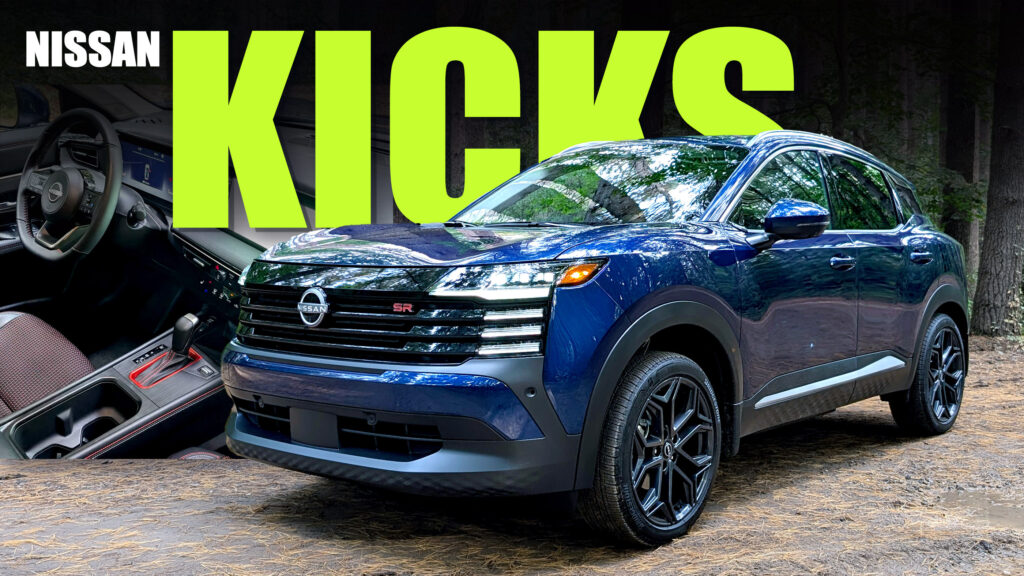
The new Kicks is an improvement on its predecessor, but can it stand out in a competitive class?
October 20, 2024 at 13:38
The Nissan Kicks is one of the brand’s best sellers. Despite going into the first generation’s final year of production, the brand saw a 21 percent increase in sales from 2022 to 2023. Nissan is doubling down with an all-new Kicks, promising more space, more technology, and a bolder overall package. The question is: does it deliver?
To find out just how good this new Kicks is we traveled to Detroit, Michigan, home of the Nissan Technical Center. That’s where the automaker told us that it wanted this new car to provide an expressive design, advanced tech, and a confident driving experience. Lofty goals for a budget subcompact crossover, no doubt, but we were curious to see how they played out in the real world.
Read: 2025 Nissan Kicks Back With Tougher Looks, More Power, And AWD
We spent a little time with the team there to get a better feel for what went into this new subcompact segment player. Then, we took the new Kicks out onto the pavement and even onto some gravel roads for in-person testing. It turns out that this segment is heating up and the Kicks is a new and compelling option.
Quick Facts
More Power And More Grip
Pop the hood on the new Kicks and you’ll find a very neatly packaged, naturally aspirated 2.0-liter four-cylinder engine with 141 horsepower and 140 lb-ft of torque. That powertrain is the only one you’ll get across the lineup no matter how much one spends. While enthusiasts might clamor for more oomph, the Kicks does make considerably more than the outgoing model which had just 122 horsepower (90 kW) and 114 lb-ft (154 Nm) of torque. Keep in mind too that there is no hybrid power here.
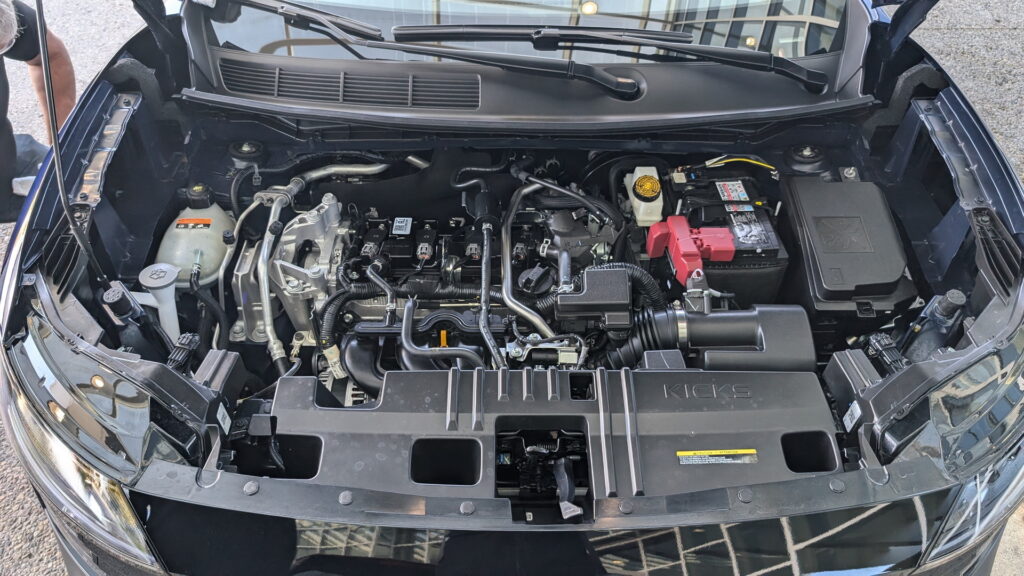
The Kicks is exclusively an ICE-powered vehicle. Nissan says it’ll get up to 28 mpg in the city, 35 on the highway, and 31 combined. Adding all-wheel drive reduces each of those figures by one mpg. That’s another key point worth pointing out though. For the first time, the new Kicks offers all-wheel drive as an available option throughout the lineup. That’s somewhat rare in this segment. The Hyundai Kona also offers it, but costs more and can’t provide the same level of fuel economy.
Nissan touts the all-wheel drive setup in the Kicks as a “new intelligent AWD” system. It features new software logic and Vehicle Dynamic Control settings to improve line traceability. In short, that means that it shouldn’t understeer in the same way that the Rogue Sport would at times.
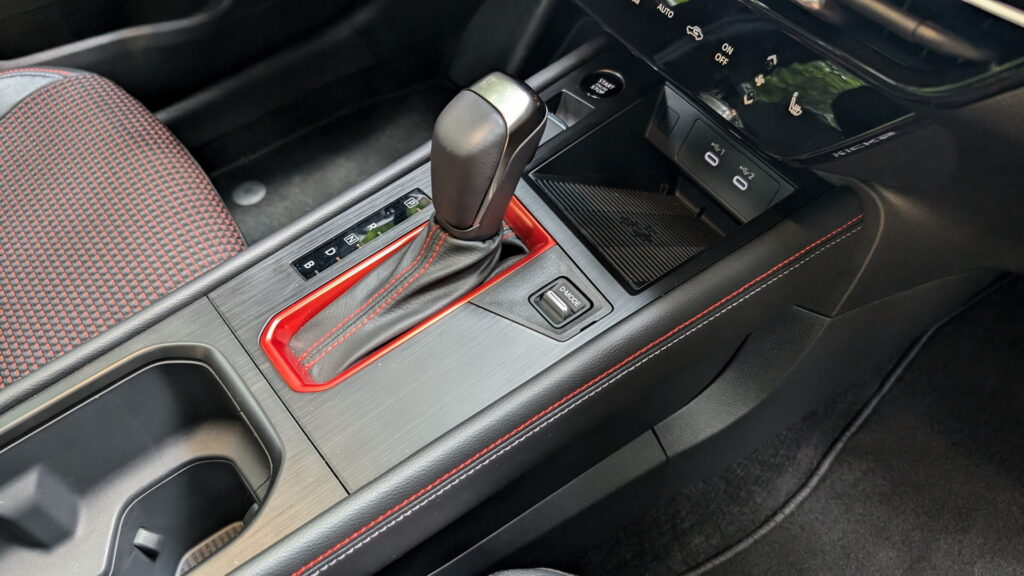
Nissan also leverages braking force to the inside wheels to help the Kicks make its way around some turns. AWD Kicks models typically run in front-wheel drive mode for the best possible fuel economy but they can send power to the rear wheels before the front wheels slip. Interestingly, Snow Mode in the Kicks forces some torque to the rear wheels constantly and works at all speeds.
Interior Adjustments
Photos: Stephen Rivers/Carscoops
Across the automobile world, cars are getting bigger and the Kicks follows suit in that manner. It’s now 2.8 inches (71 mm) longer, 1.6 inches (41 mm) wider, and up to 0.8 inches (20 mm) taller than the previous generation. Those changes result in more passenger volume and more cargo space. In fact, it’s clear from the first time one sits down that this isn’t a car that feels cramped, at least not upfront.
At 6’6 I had no issue getting comfortable in the driver’s seat. Nissan’s famous Zero Gravity seats are standard across the lineup in both rows of the Kicks. The only thing I didn’t like about them is that they sit too high up in their lowest position.
Of course, for drivers who aren’t as tall as me, this could be one way that Nissan is hoping to achieve that “confident driving” feel. On the plus side, they’re supportive in a way that very few other car seats manage to be. Nissan also added thicker carpet and other insulation to quiet the cabin.
The layout is simple and easy to use. The steering wheel features several buttons to control the gauge cluster features, the infotainment system sits low and out of the way and then we run into the first real bugaboo in the Kicks: climate controls. Namely, they’re all touch-sensitive buttons. Whether you get the input right or wrong, you’ll need to take your eyes off of the road and look at the panel to be sure about it.
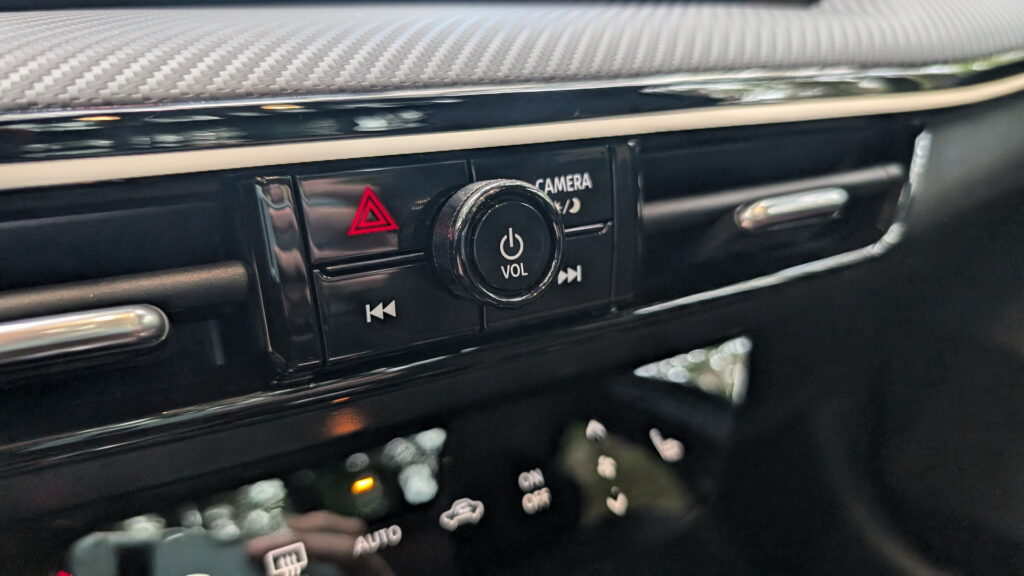
Thankfully, the rest of the cabin appears free of problematic design. A physical volume knob and power button are welcome additions along with a track-back/skip button and a camera button. The infotainment and gauge cluster screens are larger than in most other vehicles in this segment.
The graphics are bright, the menus are intuitive, and the response times are quick. Android Auto and Apple CarPlay are standard. Speaking of infotainment, Nissan also offers a fancy 10-speaker Bose sound system in this car. Check that box and you’ll even get two speakers in each of the front-row headrests. Having spent time in the Chevrolet Trax, Subaru Crosstrek, and Mazda CX-30 recently, the Kicks sounded the best by far in terms of sound quality.
As for space, the Kicks certainly offers more than before but don’t mix it up for a mid-sized SUV. Taller adults won’t be very comfortable in the back seats. I couldn’t sit up straight and had to straddle the back of the front seat when back there. Despite that, it’ll fit most passengers shorter than myself quite easily. Nissan also offers versions with USB ports for the rear occupants. An available panoramic moonroof, exclusive in this class to the Kicks, was also a nice option to have.
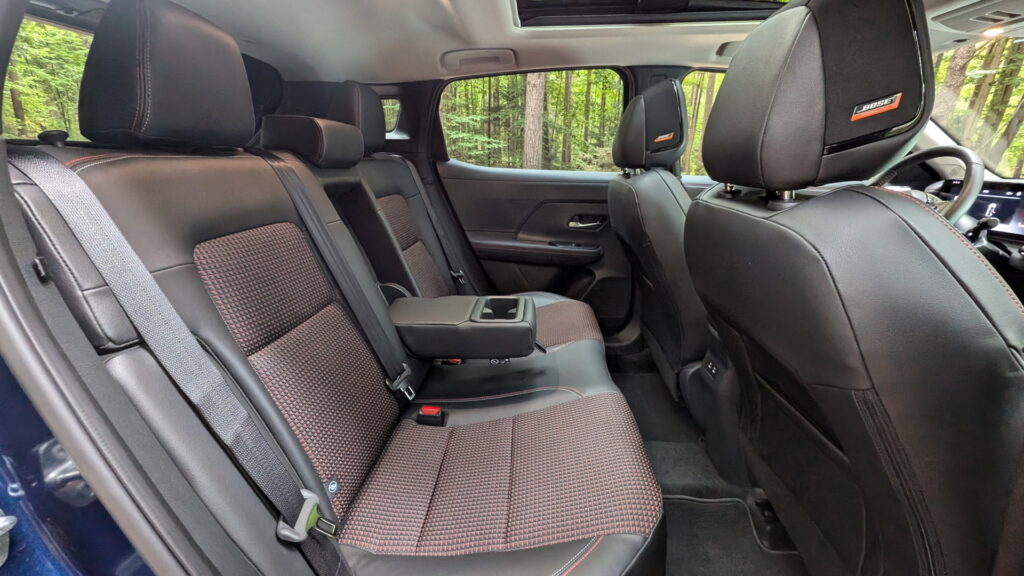
Behind the second row, owners will find 30 feet of cubic storage space. Drop those seats down and that expands to 60 cubic feet. That’s dramatically more than you’ll get in something like the Mazda CX-30 or the Buick Envista.
More: We’re Driving The 2025 Nissan Kicks, What Do You Want To Know?
To sum up, the cabin is perfectly acceptable. Nothing about it really wowed me but nothing felt overly cheap or like a pure cost-cutting measure. The seats are very comfortable and the infotainment system and other controls are very slightly above average for the segment.
Drive Impressions
Photos: Stephen Rivers/Carscoops
Beyond feeling as though I was sitting too high up in the Kicks, the ride was what most of you would expect. To be frank, it was uninspiring, but at the same time, it does feel better to pilot than the outgoing car. Nissan says that the new platform in the Kicks provides better torsional stiffness, a smaller roll angle, and a higher lateral g capability. Having driven it all around Detroit, those statements feel unquestionable.
At the same time, the powertrain is nothing to get excited about. Sure, it does have more power than the outgoing generation but it’s also heavier. Depending on the trim level and curb weight, the new Kicks can end up with a worse power-to-weight ratio though it’s typically slightly better. The difference is small enough that the increased horsepower likely isn’t something you’ll notice if you’re trading up from the older Kicks.
Though not on a drag strip, we did get a chance to test the Kicks’ 0-60 mph time and at first glance, it wasn’t awesome. Our first run registered an 11.89-second time with a GPS-based tracker called Dragy. Ultimately, we managed to cut off quite a bit from that though. Our best run of the day was 9.79 seconds. That’s not what we’d call brisk but in this segment, it’s all too common frankly.
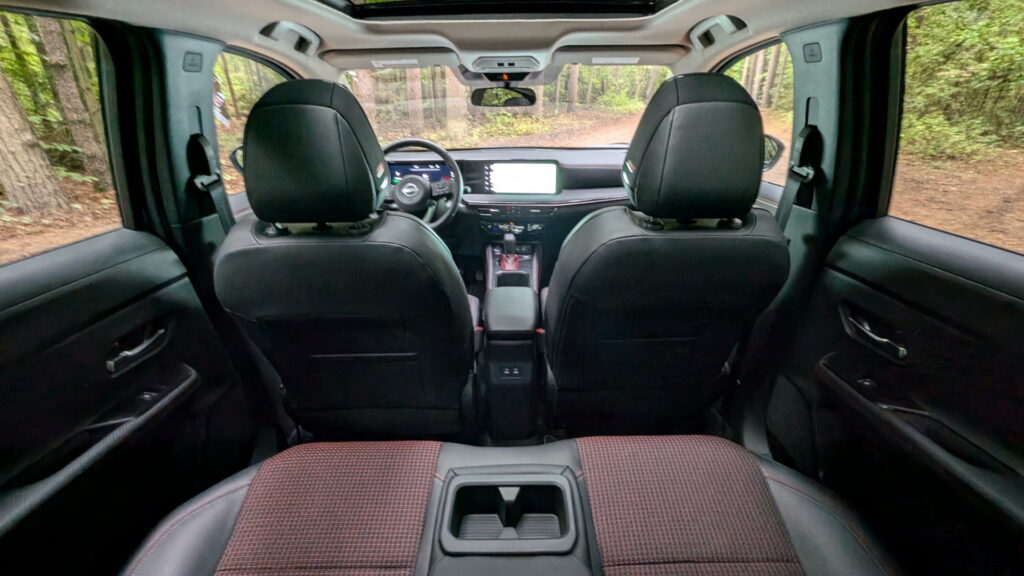
Regardless, this isn’t meant to be a performance machine, and “confident driving” comes down to more than just acceleration. The steering felt very good. The brakes did too. Even the CVT gearbox managed to be largely unobtrusive.
I especially like that Snow Mode works at all speeds because the AWD system remains engaged with power sent to the back wheels. That might just sound like PR speak but in hard fast turns it makes the Kicks feel more stable and less prone to understeer. The Kicks is comfortable too. The roads around Detroit aren’t exactly pristine but I didn’t notice this little SUV getting unsettled by potholes or cracked pavement at all.
In terms of outright practicality, it’s worth noting that the Kicks comes standard with a slew of driver aids like automatic emergency braking, lane-departure warning, automatic high beams, blind-spot warning, rear cross-traffic alert, adaptive cruise control, and rear automatic braking. Those who want it can splurge for Nissan’s ProPilot assist which adds lane-centering, intersection assist, blind-spot intervention, and more.
The Competition
This segment is more competitive than ever before. The folks at Nissan targeted at least three main competitors here. They include the Chevrolet Trax, the Kia Soul, and the Hyundai Kona. Being last to the party so to speak enabled Nissan to look at the other players before releasing the new Kicks and the brand certainly leveraged that knowledge.
The Kicks offers a lot for the money when comparing certain aspects of it to those three rivals. It has larger screens than all but the Kona. It has more driver-aid features than all but the Kona and costs less than the Hyundai in a trim-for-trim comparison. It’s the only one with features like the Bose headrest speakers or the panoramic moonroof.
At the same time, it’s worth noting that there are other factors to consider. For example, if you care about driving dynamics, the Mazda CX-30 is in a completely different league while offering a nicer interior. If longevity and warranty coverage are key to you, Hyundai and Kia offer far more in that realm. Other brands like VW or Buick offer a bit more luxury too.
2025 Nissan Kicks MSRP
Verdict
It’s hard to ignore the value the Kicks offers—especially for first-time buyers or younger drivers looking for a tech-heavy, affordable subcompact crossover that ticks most of the practical boxes. Is a fully loaded, top SR trim with all-wheel drive rally worth over $32,000? For some, the extra tech, better audio system, and a few added features might justify the price tag, but for most, that feels more like a stretch than a smart buy. You’re getting a lot of bells and whistles, sure, but that price point starts to push the Kicks into territory where much more compelling vehicles exist.
In reality, sticking with the lower to mid-level trims makes far more sense. Starting at $21,830 for the base front-wheel-drive model and maxing out at $25,330 for the AWD SV (before the $1,390 delivery and destination fee), these trims offer much better value. You still get great fuel economy for a non-hybrid engine, awesome cargo space, a lot of great technology, and a comfortable interior without venturing into questionable pricing.
Based on everything I experienced in this car, I think there’s a perfect market for it: younger people. This is a car focused on safety, practicality, technology, and comfort. It’s sort of a perfect jack of all trades (with a couple of strengths like audio equipment) that young people can enjoy without breaking the bank.
Nissan also offers two years or 24,000 miles worth of complimentary maintenance coverage with it. This isn’t a perfect car, but it improves on everything from the original Kicks and adds a few things to that recipe that help it stand out in a very competitive class.

cheap stromectol – ivermectin 12mg tablets for humans tegretol canada
buy absorica pills – order isotretinoin generic order linezolid 600 mg sale
cheap amoxil pill – valsartan order ipratropium 100 mcg for sale
azithromycin canada – order tinidazole pills bystolic 20mg drug
prednisolone 10mg oral – buy progesterone pills cheap progesterone 100mg
buy lasix online cheap – buy nootropil no prescription order betnovate 20gm creams
purchase amoxiclav pills – ketoconazole over the counter order duloxetine 20mg generic
acticlate order – albuterol without prescription buy glucotrol sale
amoxiclav ca – augmentin 1000mg cost order duloxetine 20mg sale
semaglutide 14 mg uk – buy semaglutide 14mg sale buy generic periactin
cialis 20mg brand – cheap sildenafil tablets order sildenafil 50mg online cheap
oral viagra 100mg – purchase cialis online cheap real cialis pharmacy prescription
This write-up hit the nail on the head; that’s exactly what I needed to hear.
Your approach captivated me from the first sentence, great job.
order cenforce 50mg pill – cenforce 100mg sale how to get glucophage without a prescription
order atorvastatin pill – lisinopril 5mg over the counter generic lisinopril
buy atorvastatin 20mg – lisinopril usa lisinopril 5mg generic
omeprazole 10mg for sale – oral tenormin buy tenormin 50mg generic
buy methylprednisolone 16mg – depo-medrol uk order triamcinolone pills
oral clarinex 5mg – order clarinex generic dapoxetine online buy
order cytotec 200mcg sale – diltiazem pills buy diltiazem 180mg generic
buy acyclovir without a prescription – order acyclovir 800mg crestor online buy
buy motilium cheap – cost tetracycline 250mg buy cyclobenzaprine 15mg generic
purchase motilium generic – buy motilium 10mg online flexeril order
inderal 20mg us – generic plavix methotrexate 2.5mg oral
order coumadin online cheap – buy reglan generic losartan 50mg pills
order levofloxacin without prescription – order levofloxacin 250mg without prescription buy ranitidine without a prescription
nexium 40mg tablet – buy topamax 100mg for sale buy generic imitrex 25mg
mobic over the counter – buy mobic 7.5mg sale order tamsulosin generic
buy ondansetron pill – ondansetron medication where to buy simvastatin without a prescription
valacyclovir 500mg tablet – valtrex 500mg usa fluconazole 100mg brand